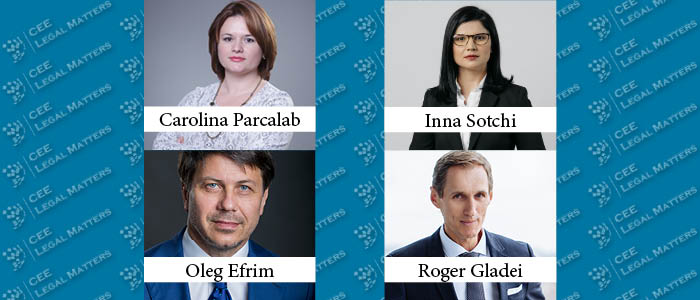On June 23, 2022, the European Council granted Moldova the status of candidate country for EU accession. ACI Partners Legal Manager Carolina Parcalab, Bivol Sotchi & Partners Managing Partner Inna Sotchi, Efrim Rosca si Asociatii Managing Partner Oleg Efrim, and Gladei & Partners Managing Partner Roger Gladei explore the recent changes in Moldova resulting from its new status.
Hitting the Ground Running
After being granted EU candidate status, Moldova seems to have witnessed some immediate changes, on both legal and social issues. “There have already been many direct and indirect, not so obvious but significant changes after this important milestone was achieved by our country,” Efrim points out. “To name a few, Moldova received humanitarian assistance from the EU during the Russian aggression against Ukraine – the EU allocated EUR 13 million to Moldova for humanitarian aid – and the Council of Europe approved a new macro-financial assistance operation worth EUR 150 million for Moldova between 2022-2024. Additionally, a temporary trade liberalization was granted for seven agricultural products from Moldova, allowing increased exports to the EU without customs duties.”
The most significant immediate transformation in Moldova, which occurred overnight upon receiving EU candidate status, as described by Gladei, “is the feeling that [EU accession] is now irrevocable. Before we had dreams, plans (the 2014 association agreement), and facilities (the DCFTA and free visa regime), but now we have certainty. Not necessarily that it will happen in the short run, but it seems the old east-west ping-pong is over.” All of this, according to Gladei, “will lead to a cultural shift, from the post-Soviet extractive model to the modern inclusive model.”
Mapping the Long Road Ahead: A Nine-Area Plan
The expected legislative changes in Moldova for 2023, to secure its EU accession, are manyfold. “The European Commission in its opinion on the application for the accession of the Republic of Moldova to the EU formulated nine areas to be reformed,” Sotchi points out. “These nine areas are related to justice reform, the electoral framework, fighting corruption, deoligarchization and reduction of the influence of private interests, combating organized crime and money laundering, improvement of public services, the reform of public administration, public finance management, involvement of civil society, and human rights.”
Parcalab adds that, consequently, “the Moldovan Government Action Plan, approved in February, announces a number of legal amendments required due to Moldova’s EU candidate status. The Action Plan for 2023 aims to respond to the Commission’s observations on Moldova’s application for EU membership.” According to Parcalab, “the government actively implements the Action Plan and has already prepared important draft laws to be presented for Parliament approval.”
“Though Moldova already has a relatively good track record in transposing and harmonizing EU legislation, a lot of areas are still to be aligned,” Parcalab points out. According to her, the major challenges related to the upcoming legislative reforms stem from the fact that “many legal concepts in EU company law, taxation, consumer protection, competition, and financial markets are still new to Moldova, and require careful research and understanding by public authorities, private entities, and courts to ensure their proper implementation and adaptation.” She hopes “this process is not performed blindly, at any cost. We hope that the harmonization process will take into account the local realities and specifics, to create a predictable and balanced legal environment that would stimulate economic growth and the country’s stability.”
The Roughest Terrain: Reforming the Justice System
Gladei, Sotchi, and Efrim all believe that, in the years to come, out of the nine areas, reforming the justice system will be an exceptionally challenging task. “The European Commission June 2022 ‘nine-steps’ approach has required Moldovan authorities to visibly advance on judicial reform, deliver on the corruption fight commitment, eliminate the influence of vested interests, advance public administration and public finance reforms, enhance civil society involvement, and strengthen the protection of human rights,” Gladei says. “The judicial reform – perceived as the most important while difficult – has already born fruit in the external evaluation of the integrity of judges and prosecutors, and new rules of selection for the Supreme Court judges. This effort aims to restore the trust in the judiciary, severely affected during the recent decades.”
Commenting on judicial reform, Sotchi adds that “achieving justice reform is a complex and difficult process for Moldova. Several factors contribute to the difficulty of this process. The judicial system in Moldova faces a shortage of resources and personnel. There is a lack of auxiliary staff, including assistants and clerks, due to the miserable salaries.” She also draws attention to the lack of modern equipment in courts, saying “it can affect the quality of the judicial process. Since the beginning of 2023, more than 15 judges have resigned from their positions. As a result, the cases examined by them are assigned to the other judges, who already have numerous cases to examine, which will result in either delaying the examination of cases or their superficial examination.”
Finally, Efrim emphasizes the role of the judiciary in the fight against corruption: “While there is evidence of a slight increase in efficiency in the investigation and prosecution of systemic and high-level corruption cases, the main challenge remains the finality of cases heard before courts, largely due to the adjournment of hearings and intentional delay of judicial review at the initiative of the defense, constraints in securing witness evidence in court hearings, and the uneven application of the law by courts. It will improve public trust, enhance the business environment, optimize resource allocation, strengthen the rule of law, and attract international support, leading to a positive impact on Moldova’s social, economic, and political landscape.”
The Growing Need for Legal Professionals
The newly attained EU candidate status, among others, is likely to lead to an increase in the need for legal expertise. “Firstly, there will likely be an increased demand for legal expertise as Moldova aligns its laws and regulations with EU standards, requiring businesses and individuals to navigate the new legal landscape,” Efrim says. “Secondly, closer economic ties to the EU may lead to more cross-border transactions for Moldovan businesses, resulting in higher demand for legal advice on issues such as contracts, dispute resolution, and compliance with EU law.”
On the other hand, “as a result of the Russian war in Ukraine, Moldova has become an unfavorable country for investments. Consequently, many people refuse to bear additional expenses, such as those for quality legal assistance,” Sotchi adds. “We expect that by obtaining the EU candidate status, and support from the EU, Moldova will become an attractive country for foreign investments which will result in more work for lawyers.”
Still, Gladei points out that lawyers are already offering new services to clients, “related to data protection and privacy – based on the GDPR extraterritorial enforcement – compliance and e-KYC, competition and regulatory clearance, local setup, and cross-border trade.”
This article was originally published in Issue 10.4 of the CEE Legal Matters Magazine. If you would like to receive a hard copy of the magazine, you can subscribe here.


